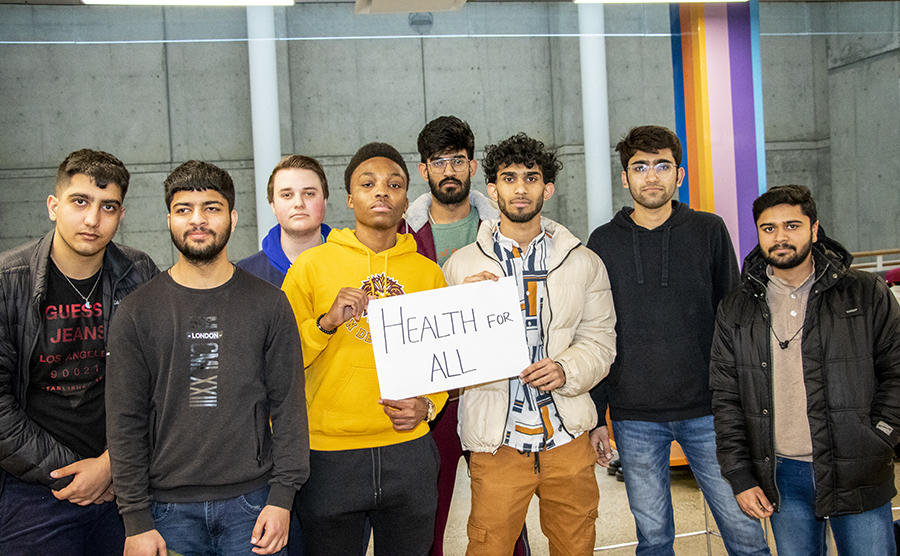Ontario took a step away from universal healthcare 30 years ago, and international students are still paying
World Health Day, celebrated annually on April 7, is observing the theme ‘Health for All’ in 2023.
While Canada is known for its universal and free healthcare, the narrative does not extend to all international students in the country.
Ontario is one of only four provinces in Canada where international students are not offered provincial public health insurance.
The Ontario government eliminated Ontario Health Insurance Program (OHIP) coverage for international students in 1994. Since then, international students have been paying for private health insurance.
The Canadian Federation of Students (CFS) – Ontario has been actively advocating to reinstate provincial health coverage for international students.
Mitra Yakubi, chairperson at CFS Ontario shared why this is an important issue, “Not having provincial health coverage puts international students in a precarious situation because they’re not able to access preventative health care that they deserve. They have to pay for some things out of pocket, it puts them in a difficult situation where they don’t have access to something so fundamental.”
International students in Ontario, including those at George Brown College (GBC), pay an average tuition fee of $8,000 per semester for a post-graduate program. In purchasing private health coverage through university or college, they pay an additional $500 to $700 per year.
International students in post-secondary programs at GBC currently pay $756 for a one-year health coverage and $518 for eight-month coverage.
The health coverage plans for students are usually rolled out by the student unions at institutions. At GBC, the Student Association (SA) is responsible for arranging health coverage plans and helping students understand their insurance.
Health benefits at the SA helps students with their insurance and its particulars.
Yukiko Ito, senior coordinator of Health Benefits shared that majority of students approach the service to ask questions regarding availing their insurance.
“The healthcare system in Canada is different from their home country, so it is difficult for them to adapt the process at the beginning. For example, they might be able to book their specialist by themselves, but in Canada they need to see the general practitioner first and then they are referred to specialists,” she said.
Students do not usually come to health benefits with issues regarding cost of insurance, as it is paid along with their fees before coming to the country in most cases.
International students are often unaware of the health coverage disparity they face.
“There is a genuine sense of disappointment whenever we have a conversation and I let them know that like OHIP was something that was available for international students in Ontario up until 1994, they are ultimately surprised but also disappointed,” shared Yakubi. “There is also a sense of frustration, recognizing that international students, again, are paying thousands of dollars to be in these institutions.”
International students at GBC expressed similar surprise and frustration.
“The thing is I didn’t know, but it would be beneficial for international students. As you know, the fees for international students is increasing each year. And if they gave us health coverage, we wouldn’t have to pay extra for healthcare so it would be much more comfortable for us,” said Aum Zaveri, an international student from India.
Zaveri paid for his health coverage along with tuition fees before coming to Canada.
Shakir Bourne, another international student, expressed similar views.
“Having provincial coverage would allow me to save money, I have tooth issues and if I had another issue later on, it would be very painful to go through exams and school and not being able to financially fund.”
Neither Zaveri nor Bourne have availed themselves of their insurance benefits yet, they are required to have health coverage throughout their duration of stay in Canada as international students.
Domestic students, on the other hand, are more aware of the advantages of having provincial health coverage.
“Provincial health insurance covers many emergency and preventive medical expenses. Health insurance in general makes me not have too much financial pressure when seeking medical treatment,” Daniel Wei, a domestic student at GBC said.
“Including international students in the provincial insurance can definitely reduce or ease their financial pressure. Besides many full-time students have to take part-time jobs during their studies, it is unreasonable for the government to require foreigners to work more hours in order to enjoy medical benefits,” Wei added.
CFS Ontario advocates for international student rights through the ‘Fairness for International Students’ campaign. The campaign was launched to achieve elimination of fee disparity, restoration of OHIP, and improvement of immigration policies for international students.
Yakubi says that institutions and students play an important role in helping achieve the above. She adds that institutions must stand and support international students, as well as include them in conversations about equitable education.
She urges students to be involved in the campaign as well as connect with and build community with fellow international students.
“I think getting through involved through your Student Association campus groups and those community spaces becomes really, really important,” she said, “International students deserve the right to health care and health care that gives them preventative health care. coverage. So, it’s about mobilizing within international student spaces and communities.”
Students can get in touch with CFS Ontario through the SA and the director of education and equity.


